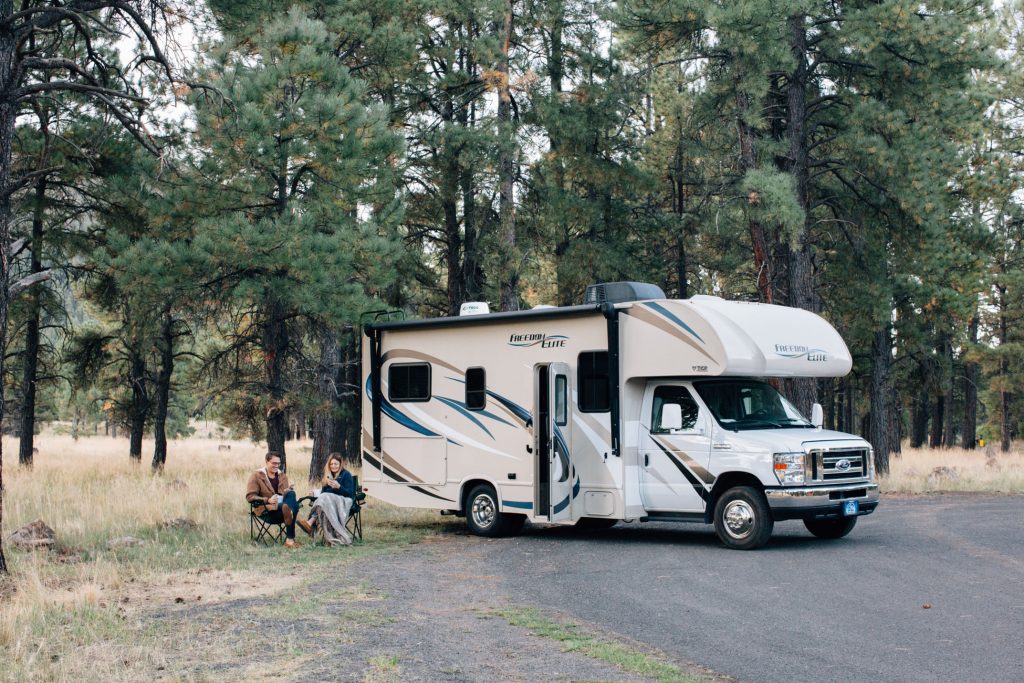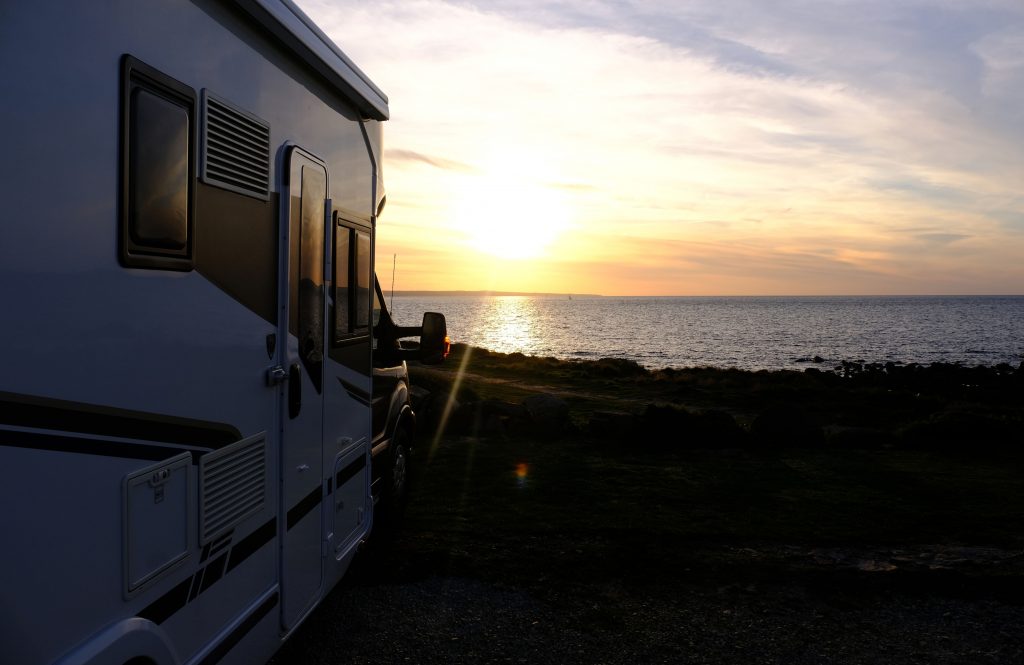Introduction: Storing Your RV
Whether you own a motorhome, camper trailer, or fifth-wheel RV, one crucial aspect of ownership is knowing how to properly store an RV. Proper RV storage plays a significant role in ensuring the longevity and optimal condition of your beloved travel companion during times of non-use. Storing your RV or storing your camper properly is essential to ensure the longevity and readiness of your RV for future adventures. Whether you’re a seasoned RV owner or a newcomer, mastering the art of storing your RV or camper is crucial for the longevity of your RV.
At AmericaGoRV in Seguin & Comfort, Texas, we take RV and camper storage seriously. If you are asking yourself, “Where should I store my RV when not in use?”, look no further! In this guide, we’ll provide you with the top 10 expert tips for safely storing your RV, including: where to store your RV, steps for maintenance, expert tips & tricks, and winterization techniques. By following these guidelines, you can protect your valuable investment and enjoy worry-free journeys whenever you hit the road again.
1) Choose Your Ideal Option for Storing Your RV or Camper
Choosing the right RV or camper storage option is the first step toward safeguarding your RV. Evaluate some of the available choices, such as:
■ Indoor
■ Outdoor
■ Covered storage
Prioritize factors like security, accessibility, and weather protection. Indoor or covered storage can shield your RV from the elements, while outdoor options might be more budget-friendly. A top priority when selecting an RV storage facility is ensuring the safety and security of your valuable investment. Look for facilities equipped with 24/7 surveillance, secure entry systems, and adequate lighting to deter theft and vandalism. Additionally, inquire about fire prevention measures and pest control to protect your RV from potential hazards.
From here, make an informed decision based on your specific needs and preferences for storing your camper or RV. At AmericaGoRV in Seguin, Texas, we offer FREE RV storage
with consignment. Click HERE if you are interested in storing your RV with AmericaGoRV in Seguin or Comfort, Texas.
2) Thoroughly Prepare Your RV for Storage
Preparing your RV properly before storage is crucial for its well-being during its dormant
phase. Begin by completely draining the water system to prevent freezing and potential damage. You should remove all perishable food items to prevent attracting pests and causing unpleasant odors. Also, don’t forget to disconnect the batteries to avoid drainage over time! Some believe that removing your battery all together is the best method to ensure the longevity of your battery life but that action is up to you.
3) Ensure a Spotless Interior & Exterior Before Storing an RV
Prior to storing your camper or RV, make sure to give it a deep clean. This reduces the
risk of mold, mildew, and other damages that are caused by moisture and residue. Also, wash the exterior thoroughly to remove dirt and residue from your previous adventures. Inside your RV, wipe down all surfaces, vacuum the floors, and clear out any debris. We recommend leaving cabinets and doors slightly ajar to promote ventilation and minimize the chances of mold growth while you are storing your camper or RV.
4) Shield Your RV from Nature’s Impact
Protecting your RV from nature’s elements is extremely important. Prolonged exposure to sunlight, rain, snow, and strong winds can wreak havoc on your RV. If you plan to store your RV for an extended period, consider climate-controlled storage options. Extreme temperatures and humidity can damage your vehicle over time. Climate-controlled facilities help regulate temperature and humidity levels, preserving your RV’s interior and exterior. If you are looking at outdoor RV storage options, consider investing in a high-quality RV cover to shield it from harmful UV rays and keep rainwater off its surface.

P.S. – If you have access to indoor storage, this method offers the most comprehensive protection to store an RV.
5) Disconnect & Power Down All Systems for Proper RV Storage
For safety and prevention of potential hazards during RV storage, ensure all RV systems
are disconnected and powered down. Turn off the main water supply, disconnect the propane or other natural gas tanks, and make sure to power down the electricity. Neglecting this step could lead to leaks, fires, or electrical malfunctions, which may go unnoticed until you’re ready to set off on your next journey.
6) Drain All Fluids from Your RV
As winter approaches, it brings forth potential hazards for your beloved RV or camper. The menace of freezing fluids lurks, threatening to transform into cracked pipes once the thaw arrives. To protect your RV, be sure to purge the plumbing system and water heater tank. A recommended best practice to store an RV also call for you to embrace antifreeze as your ally. Use this protective agent on your various systems, including waste tanks, piping, and valves. A well-prepared and protected RV ensures that your RV adventures continue as planned once you are ready to hit the road again!
7) Keep Unwanted Guest at Bay While Storing Your RV
Guarding against unwanted guests like rodents and insects is vital to maintaining your RV’s condition. Thoroughly inspect your vehicle for any openings that critters could exploit and sneak in. Seal any gaps you find and strategically place pest repellents or traps within the RV to eliminate intruders. When storing your RV for the offseason, the last thing you want to come back to is a family of rodents making a home of your RV during the cold winter!
8) Regular Maintenance Checks While Storing Your RV or Camper
When storing your RV or camper for the offseason, your RV requires regular maintenance to ensure it remains in optimal condition. Set a schedule to inspect your vehicle periodically. Monthly visits are recommended to identify any signs of damage, maintain properly inflated tires, and assess overall RV condition. Early detection of issues allows for prompt resolution! When you store your RV or camper with AmericaGoRV, we conduct routine visits of your vehicle to check all systems and ensure a positive RV storage experience.
9) Periodically Check Your Systems RV During Storage
As mentioned earlier, checking the systems of your RV during storage is crucial. In addition to pest
control, thoroughly examine the interior and exterior for signs of deterioration. Consider starting the engine periodically to keep it running smoothly and exercise the slides to prevent sticking. Addressing minor issues promptly can prevent more significant problems down the road.
10) Change Your Oil Before Storing Your RV
One essential aspect often overlooked is the health of our trusty radiators and oil tanks. Leaving old and dirty oil just sitting around in the radiator throughout the winter can spell trouble for your entire RV once you hit the road again. Trust us, you don’t want that hassle! It can lead to oil tank degradation and a bunch of issues for your rig when it’s finally time to rev those engines.
The solution? Make sure to change your oil before tucking your RV away for the winter. Your radiator will appreciate the fresh stuff, and it’ll keep your RV running smoothly once it’s back on the road.
Here’s another pro tip: show some love to your radiator with the right amount of antifreeze. That way, you can rest easy knowing that nothing inside there will freeze up and cause nasty cracks. Trust us, you don’t want to come back to a cracked radiator after a long, cold winter – that’s no way to start your next adventure!
Wrapping Up: Storing Your RV
Proper RV storage is essential to protect your investment and maintain the longevity of your recreational vehicle. Choosing the right storage facility and following proper preparation steps will ensure your RV is ready for your next adventure whenever the road calls. By taking the necessary precautions and following the guidelines in this guide, you can enjoy worry-free RV storage and make cherished memories on the road for years to come

RV Storage FAQ
Can I store my RV at home?
Answer: Storing an RV at home depends on local regulations and space availability. Some
neighborhoods and homeowner associations might have restrictions on RV storage so it is important to check your HOA guidelines before planning to store an RV at home. If you have ample space and your local laws allow it, storing your RV on your property can be a cost-effective option.
How much does it cost to store an RV?
Answer: The cost of RV storage can vary based on location, storage options (covered, indoor,
or outdoor), and the duration of storage. On average, outdoor storage can cost between $30 to $100 per month, while indoor or covered storage might range from $50 to $250 per month. At AmericaGoRV in Seguin & Comfort, Texas, we will store your RV for FREE with consignment consideration. Click HERE to contact us about RV storage with consignment.
Can I access my RV anytime while it’s in storage?
Answer: Generally, reputable RV storage facilities offer convenient access to your vehicle
during their operating hours. Some facilities even provide 24/7 access, ensuring you can retrieve your RV whenever needed. When you store an RV with AmericaGoRV in Seguin or Comfort, Texas, just let us know when you plan on taking a trip with your RV and we’ll get it ready for your – FREE of charge.
